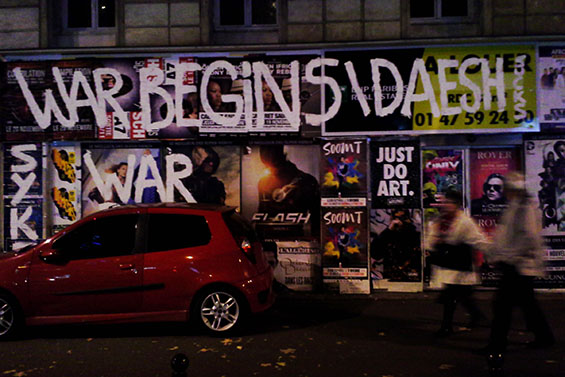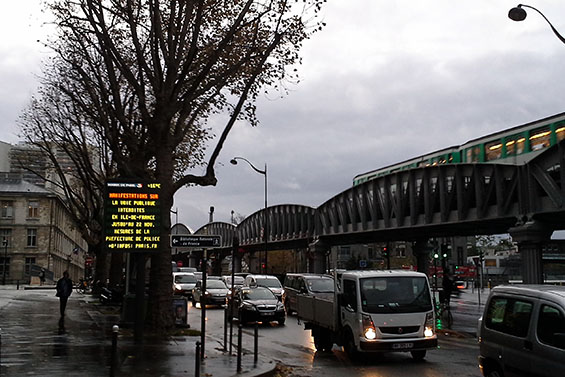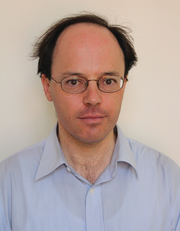
France is high on war. After last Friday’s abominable bloodbath, François Hollande declared a ‘pitiless war’ of retaliation on Jihadism. It would seem that for the president, terror can still, in 2015, be bombed out of existence, and military intervention remains the key to the Middle East. Fists clenched, Hollande’s Prime Minister, Manuel Valls, declared that Daesh would be ‘annihilated’, ‘blow for blow’ – ‘on the same level’ as the original attacks. Were it not so predictable, the madness would be breathtaking.
Friday’s attacks were monstruous. But the French government’s battle cries are more frightening. Violence breeds violence. French political elites and their courtiers have set the nation on course for more tragic deaths.
Currently, Hollande’s measures, including the extended state of emergency, are widely supported. These measures make public demonstrations illegal. Too bad for the protests that had been called for the upcoming climate summit: ‘security’ is the most fundamental right of all.

Legislators wanted to go further. An amendment to the state of emergency law allowing gagging of the press, supported by 28 government members, was ultimately not adopted. Perhaps it can wait until after the next attack. Meanwhile, requests to join the army have tripled. More than 62 per cent of the population, according to a recent poll, even want to see French ground troops in Syria. No anti-war movement has yet made itself felt.
The last few days have offered dismal confirmation of a familiar constant: despite its refrains of peace, democracy and other shibboleths, mainstream liberalism does not offer the political resources needed to effectively resist the siren calls of bombs and crackdowns. Only one Socialist deputy – Pouria Amirshahi, representing French voters overseas – has publicly challenged the government’s crusade. Everyone else has fallen into line, deploying the full ideological arsenal of French Republicanism to justify the use of the military one.
On Sunday, at Place de la République, in the heart of the area targeted a few days earlier, a sombre crowd laid flowers and lit candles under the statue of Marianne, the embodiment of Liberty, Equality, and Fraternity. Others alternated chants of contre la haine, l’amour – ‘against hate, love’ – with the Marseillaise and its calls for citizens to take up arms. The paradox should have been glaring.
The following Monday, on radio, the Education Minister, Najat Vallaud-Belkacem, read the Daesh outrages since January as a sequence of attacks on the founding principles of the French Republic. In the Charlie Hebdo killings, liberty – of expression – was attacked. The antisemitic targeting of the kosher supermarket was an assault on equality. Fraternity was attacked in last Friday’s terrible slaughter.
Vallaud-Belkacem was far from alone in choosing to frame Jihadist violence as a war of religion against the secular ‘values’ and ‘soul’ of the modern French state. This framing has two immediate advantages: it allows France’s domestic and foreign policies to be disappeared from the explanation of the Islamist threat; and it rallies the nation, at a moment of serious crisis, behind the bespoke Republican ideology of the French ruling class.
The key work this ideology does is to obscure Jihadists’ various concrete, human, and political motivations through their essentialization as ‘inhuman’, ‘Satanic’, and ‘barbarous’. ‘Let’s spare ourselves the effort to credit our enemies with too complex motivations’, urged the historian Jean-Noël Jeanneney in Le Monde. The opinion columns of the serious media, from the centre-left Libération to the right-wing Figaro, have obliged.
In doing so, they have offered yet another illustration of intellectuals’ and artists’ role as the servile ‘guard dogs’ of elite political hegemony – a status dissected by a long line of critique extending via Chomsky, Marcuse and Paul Nizan back at least as far as Marx and Engels.
One mode in which the jihadist enemy is essentialized is religious. Against the unified French Republic stands not Islamic fundamentalism, but Islam as a whole – by no means a French particularity, as Slavoj Zizek’s repeated disgraceful recent interventions on refugees have shown.
The omnipresent stress on the homogeneity of Republican citizenship – the essential sameness of all citizens before the law, as embodied in the ban on the headscarf in government premises – makes it easier to think of Muslims as all alike, too. For Abdennour Bidar in Libération, ‘Islamic civilization’ as a whole ‘is the sick man of global civilization, and Daesh is just its worst symptom’.
Predictable calls have multiplied for all French Muslims to prove they don’t support jihad. In Le Monde, Jean-François Bouthors called on women to give up headcoverings, and men to return to ‘secular’ clothing. The corollary of this – France rechristianising – has duly been demanded in the Figaro. Could Islamist terror actually inflect French secularism? Christian references were prominent among the messages displayed round République on Sunday.
The other version of the ideological essentialization of the jihadist threat is cultural. The nation’s confrontation with Islamism is frequently read through the lens of French cultural supremacy.
The novelist and journalist Marc Lambron, elected to the Académie française last year, was more direct than most. War is inscribed in France’s being, he told the Journal du dimanche: in history, France represents ‘a culture of refined warriors’.
By contrast, a massacre like Friday’s is characterised by its cultural ‘literalism’ or ‘illiteracy’; it is ‘a way of abolishing the culture of positive exorcisms and catharsis’ that is found in cultural expressions like hard rock, ‘so as to inflict an expressionless death’.
For the historian Georges Bensoussan, interviewed by the Figaro, one of the factors behind France’s failed cultural integration is the fact that ‘national and cultural requirements’ have been lowered. Writing in Libération, the philosopher Soufiane Zitouni explained the terrorists as ‘kids that who video games weren’t enough to distract from the cosmic void of their existence’. The Socialist Party’s Malek Boutih, who has recommended the “human securitisation” of the French population through education and culture, would agree.
‘Do you know why I’m a Republican?’, Boutih asked the radio host Patrick Cohen. ‘I’m a Republican because there was a library in the bottom of our building, and not a rap club’. A whole generation exists, he continued, ‘where we have abandoned any cultural politics because there’s iTunes on the Internet’.
One of the things this missing cultural education has failed to instill is an understanding of caricature. Presumably, Cohen’s audience was to understand that if the Kouachi brothers had been exposed at high school to more Daumier, for instance, Charlie Hebdo would not have happened.
The message is clear: ‘we’ have culture, just like we have democracy, freedom, equality, and fraternity. No matter that we fostered, armed, and funded Islamism in the first place: ‘they’, the ‘barbarians’ – the word is used repeatedly – have none of that and hate us for it.
Cultural chauvinism fosters a climate of nationalism. In the right conditions, war is the natural sequel. The writer and poet Hédi Kaddour, who’s just won the Grand Prix of the Académie française, has called for increased military spending, criticising France for having invented ‘the war that doesn’t cost anything’.
The reactionary politics of these interventions doesn’t even need to be hidden. In an emotional opinion piece for Libération, the singer Magyd Cherfi offered a particularly bald paean to Gallic nationalism.
There are days, Cherfi memorably stated, ‘where you’d like to be called Dupont when your name’s Magyd’; ‘days where even if you’re an anarchist you wear a flag because that’s all there’s left to wave after the fire and it’s blue, white and red’. He then went on to give a roll-call of right-wing intellectuals and politicians, including the National Front and Marshal Pétain. Some days, he said, he’s ready to accept them, just because all of them are French. Periodic indulgence of fascism, for him, is part and parcel of the nation.
Of course, dissenting voices have been raised. Legal academic Mireille Delmas-Marty, philosophers Etienne Balibar and Pierre Zaoui, and many others have resisted propagandist simplification and spoken out prominently against Hollande’s response. Former PM Dominique de Villepin has been forthright. But their voices have been deafened.
In particular, they offer no direct riposte to the nationalist propaganda of Republican values used to justify the war. Most often, the arguments against the government are pragmatic and cold-blooded. In French society’s current state of emotion, shock and anger, sobriety alone is a poor persuader. Boutih repeatedly rejected ‘sociological’ explanations for radicalisation. Any possible challenge to Republican propaganda is to be condemned – anti-racist movements, the far left, objective academic research. For the government’s critics to be heard, the words from cool heads will need to be spoken with greater passion.
Islamism is a creature of Western meddling overseas. Not only that: the French government still has ongoing ties with the monarchies funding Islamist terror. These ties consolidate the power of its own domestic elites. Along with India and the UAE, Saudi Arabia has been the biggest customer for French arms since 2010. In May, Hollande signed a contract with Qatar for 24 Rafale fighter-bombers, manufactured by Dassault Aviation, which belongs to the owners of the Figaro.
The terrorists responsible for Friday’s unspeakable slaughter were products of modern France, not jihadists imported from the Middle East. Lukács’ generalization has rarely been so apt:
it is not only in foreign affairs that war is merely the ultimate and most active culmination of a policy which a country has hitherto followed ‘peacefully’. For the internal class relations of a country as well (and of the whole world), it only marks the intensification and ultimate climax of those tendencies which were already at work within society in ‘peacetime’.
Under the cover of ‘equality’, elite French Republicanism has been conducting a long, slow attack on its own society. Not, of course, with Kalashnikovs, but with selective austerity. In 2010, the state spent 47 per cent more to educate a Parisian school student than one in Seine Saint Denis, the ‘underprivileged’ – because exploited – location of Thursday’s raid.
How long will opinion-makers manage to keep the public behind them? Since Monday, the Figaro has twice used its editorials to stress that increased military spending must not blow out the budget. The ‘poison’ of debt, it said, has neither the immediacy nor the savagery of terrorism. ‘But it insidiously saps the foundations of our society.’
In the long run, it concluded on Wednesday, France’s subordination to debt and its consequences could be ‘fatal’. As a result, social spending must be further restrained. The right, clearly, wants an economy where money is spent on arms and nothing else.
Once the war deepens austerity, perhaps it will become less popular. But there will be no shortage of liberal opinion-makers, in the Figaro and elsewhere, ready to go on supporting it, whether in France or in the Middle East. This madness must be resisted. One way will be for the public to massively defy the bans on the climate demonstration on November 29.
In ‘The Fleshy Side of Mind’, Alys Moody considers Fiona Wright’s recent book of essays, Small Acts of Disappearance, and the ‘long and intimate connection’ between hunger and writing, between abstraction and embodiment:
Wright’s attention to the physicality of hunger gives this collection its peculiar oscillating tension. One of the refrains of the collection’s first essay, ‘In Colombo’, is the gap between embodiment and what she calls abstraction. It is the problem posed by her relocation to this much poorer country. There, hunger moves from ‘something abstract in the wider world’ to ‘something many-faced, insistent and ever-present’. But it also expands beyond the specific experience of hunger to encompass a broader difference between Sri Lanka, where ‘the small mechanised tasks … had all been performed by quiet men in meticulous uniforms … had all been physical and bodied,’ and Australia, where such tasks ‘now were strangely abstract’. The opposition between abstraction and embodiment, understood in this first essay as a difference between East and West or rich and poor, becomes considerably knottier as the collection progresses. The book as a whole reveals itself to be a project of understanding the embodied, of weaving together abstraction and embodiment, hoping that each will illuminate the other.
In our second essay this week, Simon West turns to the final two volumes of the collected prose of W.H. Auden, published this year by Princeton University Press. ‘For Auden’, writes West, ‘the writing of literary non-fiction prose, which largely consists of reviews, prefaces, and lectures, was far from hack work.’
The two volumes in question total well over a thousand pages. It is striking how consistently measured and thoughtful each piece is. He may repeat ideas in different forums, but you never have the sense that he has a deadline to meet, or that he ever was rash in his judgement or expression. In these last two volumes we learn a little more of his personal life, particularly his childhood, and there are discussions on homosexuality, and the occasional reflective comment on his own poetry (‘I have always thought about myself as a comic poet’, he writes in 1971). But it is his clarity of thought in describing our age of anxiety that gives his prose such lasting weight.
This month, Black Inc published Best Australian Essays 2015, a collection of the year’s outstanding non-fiction. We are delighted that ‘Fully Present, Utterly Connected,’ Tegan Bennett Daylight’s essay on The Golden Age by Joan London was included in this collection. She writes:
Perhaps the best definition of good writing is the kind that recreates this safe aloneness, this suspended awareness of the self, this being lost but at the same time attached. We adult readers can go a long time between books that have this effect, and still be entertained and even inspired by what we read. But if we are lucky, every few years a book or a writer will appear that brings this sense back – a book that makes us feel as though that stillness in the centre of movement has been both captured and, in the act of reading, reproduced.
